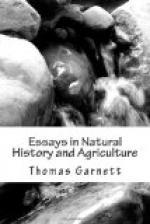In the “Perthshire Courier” of the 22nd December is the following statement: The men employed in taking the breeding fish secured a Whitling on Tuesday about three-quarters of a pound, and as they observed Salmon ova coming out of his mouth he was brought to the office of Mr. Buist for examination; on being opened, upwards of three hundred impregnated Salmon ova were taken from his stomach quite undigested. It may be, therefore, fairly presumed, that this youngster had taken this quantity for his breakfast; if he dined and breakfasted in the same style each day during the breeding season, it is difficult to estimate the expense of his keep. Such is the amount of loss of impregnated roe in one morning from one trifling fish; what must it be throughout the season from the various enemies it has to encounter?
Salmo Salar is facetious about the destruction of the roe by insects, and says, “because an aquatic insect will devour a minnow’s egg, which is not as large as a pin’s head, we have no right to infer that it will devour that of a Salmon, which is as large as a pea; it would be just as reasonable to suppose that because a wasp feasts upon a cherry, or a strawberry, therefore he will eat a turnip or a mangold wurtzel.” As he seems to have made a slip of the pen in naming the two last fruits, allow me to supply what I suppose he meant to say, which I presume was that because a wasp eats a cherry or a strawberry, we must not therefore infer that he will either eat a pear or a plum; if that is his meaning, I think I can understand it. If he adheres to his own version, I would merely observe that there is no analogy in the two cases. But the inference does not rest upon mere supposition; the freshwater shrimps at Knowlmere were seen devouring the ova in the spawning-boxes. We have seen above that Par eat ova as well as Trout. Let us suppose that the millions of Smolts (as Par) have only one meal each of Salmon roe, and we will stint them to twenty ova apiece. I fear that very few of the five millions which Salmo Salar says are deposited in the Hodder will be left to grow into Salmon. In addition to these, ducks, both wild and tame, eat them greedily. When Ramsbottom was in Galway he saw that the tame




